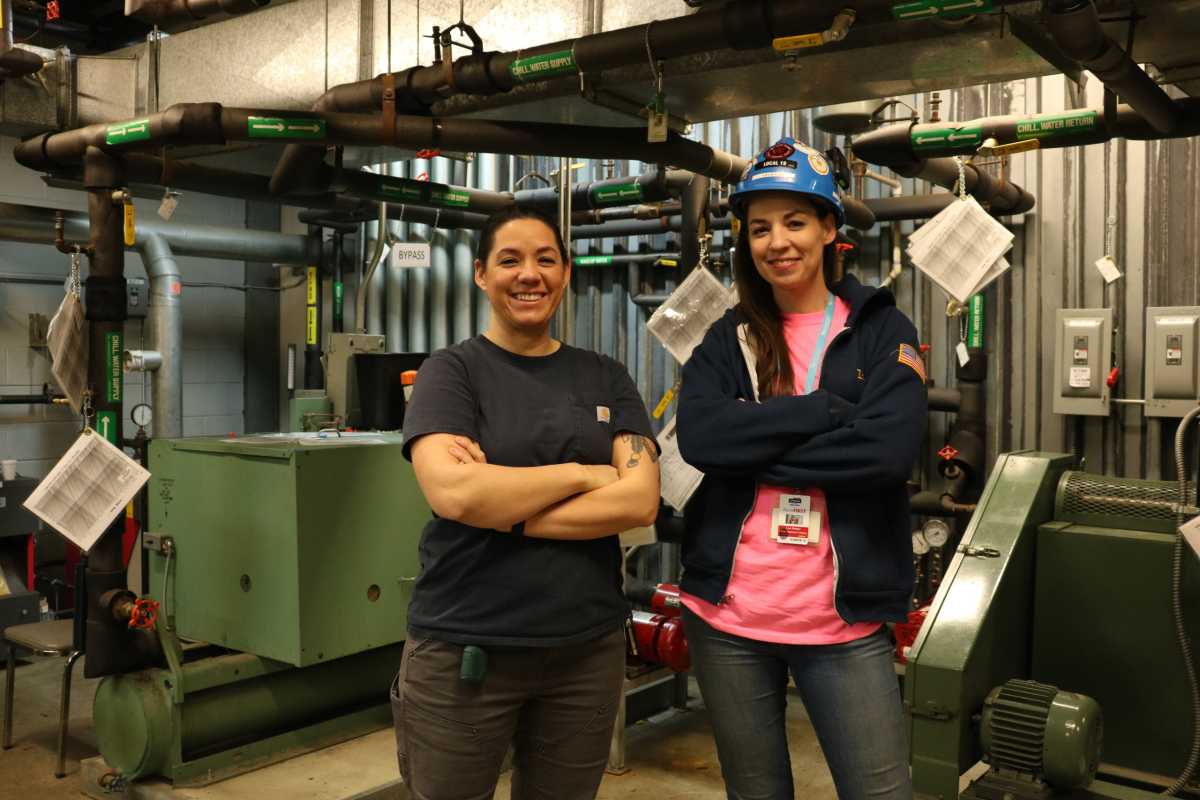A little over 16 years ago, Lisa Dungee was working long hours as a fry cook and a babysitter. Her mother had a serious brain and back injury, and Lisa needed to help support her family financially. She needed to make good money fast. In a culture rife with get-rich-quick and pyramid schemes that are aimed at women like Lisa — women who have a family to support and jobs that don’t pay nearly enough — she knew the problem had to be approached mindfully.
That’s when her father, a steamfitter with Local 420, mentioned looking into the construction trades.
Lisa was always an artistic, hands-on type of person. She and her sister, Jen Lohr, used to help their dad out with projects around the house. Two years after Lisa followed her dad’s advice and joined a union, her sister Jen signed on as well. Back when they started with Sheet Metal Workers Local 19, they were often one of the only women on the job site. Now, they’re consistently seeing more and more women on the construction projects each year, and Lisa is one of several female shop stewards with the union.
Today, only about 2.5% of tradespeople are women. But as infrastructure projects are slated to boom in 2021 due to potential federal infrastructure funding, the Philadelphia building trades unions are working overtime to get more workers on job sites – and to expand the tent to recruit more women and minorities to improve the future of the trades.
As the President/Business Manager of Sheet Metal Workers Local 19 in Philadelphia, I can attest to the top-tier work the women in our union are responsible for. Members of all genders have worked on projects in our region spanning from Comcast ITC to the PennFIRST project for Penn Medicine.
The work our members complete is essential to the economic growth and safety of our region. As air balancers, Jen and Lisa are both experts at air flow and indoor air quality, which has become critical during the COVID-19 pandemic. In February and March of 2020, Jen was working up to 24 hours per shift converting Philly hospital rooms into negative airflow isolation rooms, reconfiguring duct work to keep patients and staff safe.
One of the many great things a union contract provides is equal pay and equal benefits for workers, regardless of gender, race, or background. Female Local 19 members have the same pay and same benefits as their male counterparts. While so many industries continue to slide the wage gap issue under the rug, unions meet this issue head on. As industries suffer because of the negative impact lack of diversity has on their growth, we’re weathering the storm of the current economic crisis; we continue to train women like Lisa and Jen and individuals of all identities to build the city of Philadelphia, our region, and beyond.
Some say that construction is men’s work. Lisa and Jen have both received comments over the years that they’re “taking a man’s job” from close-minded workers outside of our union. In every case, these misogynistic naysayers lack the technical understanding that the female worker they’re attempting to disempower has.
“My husband is a software engineer, and Mommy’s the one in construction clothes, so to my kid it’s completely normal,” Jen told me recently.
When a high school girl is planning her future, construction is unfortunately not often at the top of her list. Today, school counselors and educators are aware of the opportunities that come with union membership and a construction career. Before COVID-19 hit, our union was attending career days and other activities to encourage women to get involved with the trades. It was an eye-opening experience for many young women as they learned about the debt-free career path that comes with a union apprenticeship. They can get paid to learn a trade and to shatter the glass ceiling at the same time.
As the leader of this union, there is nothing more uplifting than empowering all individuals to take command of their futures, and see them earn the wages and benefits that they deserve. We live in an era where a young girl can look up at a strong female construction worker in her hard hat and safety gear and understand that no matter where she comes from, her future is truly in her hands.
Gary J. Masino is the President/Business Manager of Sheet Metal Workers Local 19.
























